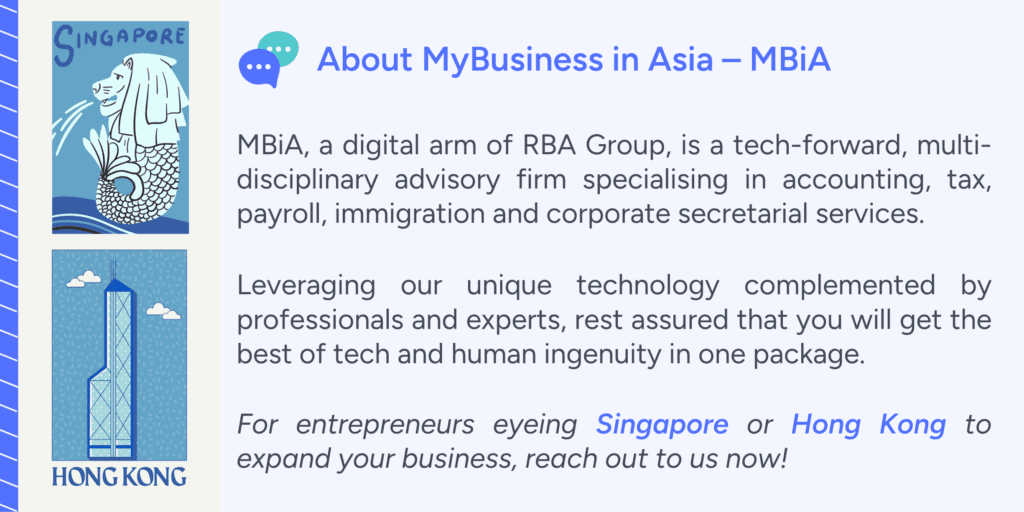Choosing the right business setup is essential for your company’s future. This decision significantly influences various aspects, such as taxation, legal liability, stakeholder perception, capital acquisition, business expansion or dissolution, and legal compliance. Foreign investors can carry on business in Hong Kong through multiple business vehicles. In this article, we focus on making a comparison between two main entity structures, namely Sole proprietorship and Private Limited Company.
Which one is the right business structure for you? Let’s explore the key differences between sole proprietorship and private limited companies to help you make an informed decision for your entrepreneurial journey in Hong Kong:
- Definition
- Pros & Cons of a Sole Proprietorship
- Taxation
- Accounting & Business Record
- Statutory Returns
Definition
A sole-proprietorship is an unincorporated business which does not have any ‘’legal personality’’, as compared with a private limited company, which has its own legal personality upon its incorporation at the Companies Registry. A sole-proprietorship is conducted by one person only, i.e. the sole-proprietor. No other investors can ‘’invest’’ into the business. In comparison, a private limited company may have up to 50 shareholders, who are able to contribute to the share capital of the company.
While the sole-proprietor gets all the profits accruing from the business, he is wholly and personally liable for the debts incurred in the business and must take up all the risks inherent in the conduct of such activity. On the other hand, shareholders in a private limited company are liable only to the extent of their initial investments/contributions into the company.
The main differences between a sole-proprietorship and a limited company are set out below:
|
Sole-proprietor |
Private limited company | |
|
Legal personality |
NO (unincorporated business) |
YES (incorporated business) |
|
Member |
One = sole proprietor |
Several = up to 50 shareholders |
|
Liability |
Unlimited & Personal |
Limited liability |
Setting up a company in Hong Kong is known for being straightforward and free of hassles. When deciding between a sole proprietorship and a private limited company in Hong Kong, it is vital to understand the pros and cons of these two business structures.
Sole Proprietorship
|
Advantages |
Disadvantages |
Easy to set up: the investor only needs to apply for a business license within 1 month of the commencement of such business. No administrative formalities required with the Companies Registry (during and after the set up process) | Unlimited & personal liability = risky business, as the sole proprietor is the only responsible person for all liabilities in the business. |
|
Efficiency in the decision making process: a sole proprietor does not need to get approval from other business partners/investors |
Losses: the sole proprietor must bear all the potential losses/failures of his business. |
|
No profits sharing |
Source of finance: the sole proprietor must contribute to the working capital all by himself (no other investors can invest into the business). This could be a potential financial limitation to start or expend the business. |
Private Limited Company
Advantages | Disadvantages |
| Limited Liability: shareholders’ liability is limited to their shareholdings, protecting personal assets | High costs of operations |
| Simplified ownership transfer and continuous existence: a private limited company continues operations and allows easy and quick ownership transfer through share transactions | Public disclosure of information: The law doesn’t require companies to reveal who ultimately owns those shares if they’re held indirectly, which means some owners can stay anonymous. |
| Attractive tax regime: private limited companies benefit from a “territorial tax” system, meaning they are not obligated to pay tax on profits earned outside of Hong Kong. | The competition is intense: new entrants may find it challenging to establish their presence quickly. |
Taxation
Same general taxation principles apply for both sole-proprietorship and private limited companies in Hong Kong:
- Territorial source principle;
- No distinction between residents and non-residents;
- Only income which has a source in Hong Kong is taxable here; and
- Income sourced overseas, even if remitted to Hong Kong, is not charged to profits tax.
A sole-proprietorship carrying on a trade or business in Hong Kong is liable to profits tax at a rate of 15%.
In addition, the Inland Revenue (Amendment) (No. 7) Bill 2017 was gazetted on 29 December 2017, introducing a new 2-tiered profits tax regime. The first 2 million HKD of profits will be taxed at half of the current tax rate (i.e. 7.5%), while the remaining profits thereafter will be taxed at the existing 15%.
Below is a comparative table between a sole proprietorship and a private limited company (from a profit tax perspective):
| Tax rate | ||
| Assessable profits | Corporations (private limited company) | Unincorporated businesses (including sole-proprietorship) |
| First 2 million HKD | 8,25% | 7,5% |
| Above 2 million HKD | 16,5% | 15% |
Accounting & Business Record
A sole proprietor is not required to prepare audited accounts, whereas all private limited companies incorporated in Hong Kong have the statutory obligation to prepare audited accounts, as detailed in the following table:
|
Sole-proprietor |
Private limited company | |
|
Audited accounts |
NO |
YES |
|
Business Records |
YES |
YES |
Nevertheless, sole proprietor shall keep sufficient records of his income and expenditures in order to assess the taxable profits. Such records include sales records, purchase/expenses records, bank statements, assets, cash received/expended, etc.
For both sole proprietorship and private limited company, business records must be kept for a minimum period of 7 years after the date of the transaction to which they relate.
Statutory Returns
Statutory returns are documents that provide regulatory authorities with crucial information about an organization’s corporate or legal status. There is a slight difference in statutory returns requirements between these two types of entities.
|
Sole-proprietor |
Private limited company | |
|
Profits Tax return |
YES |
YES |
|
Employment return |
YES |
YES |
|
Annual Return |
NO (but the sole trade will need to notify the IRD of any change of business registration particulars) |
YES |


